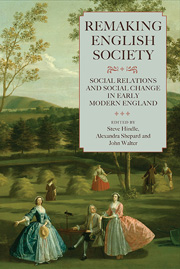Book contents
- Frontmatter
- Contents
- List of Illustrations, Figures, Maps and Tables
- Acknowledgements
- Notes on Contributors
- List of Abbreviations
- 1 The Making and Remaking of Early Modern English Social History
- 2 Brokering Fatherhood: Illegitimacy and Paternal Rights and Responsibilities in Early Modern England
- 3 Gender, Sexuality and the Consumption of Musical Culture in Eighteenth-Century London
- 4 Where was Mrs Turner? Governance and Gender in an Eighteenth-Century Village
- 5 Local Arithmetic: Information Cultures in Early Modern England
- 6 Intoxicants and the Early Modern City
- 7 Food, Drink and Social Distinction in Early Modern England
- 8 Written Obligations, Litigation and Neighbourliness, 1580–1680
- 9 Witchcraft and Neighbourliness in Early Modern England
- 10 Deference, Paternalism and Popular Memory in Early Modern England
- 11 Work, Reward and Labour Discipline in Late Seventeenth-Century England
- 12 Living in Poverty in Eighteenth-Century Terling
- 13 From Commonwealth to Public Opulence: The Redefinition of Wealth and Government in Early Modern Britain
- Appendix: Bibliography of the Published Writings of keith Wrightson from 1974 to 2011
- Index
- Tabula Gratulatoria
- STUDIES IN EARLY MODERN CULTURAL, POLITICAL AND SOCIAL HISTORY
3 - Gender, Sexuality and the Consumption of Musical Culture in Eighteenth-Century London
Published online by Cambridge University Press: 05 May 2013
- Frontmatter
- Contents
- List of Illustrations, Figures, Maps and Tables
- Acknowledgements
- Notes on Contributors
- List of Abbreviations
- 1 The Making and Remaking of Early Modern English Social History
- 2 Brokering Fatherhood: Illegitimacy and Paternal Rights and Responsibilities in Early Modern England
- 3 Gender, Sexuality and the Consumption of Musical Culture in Eighteenth-Century London
- 4 Where was Mrs Turner? Governance and Gender in an Eighteenth-Century Village
- 5 Local Arithmetic: Information Cultures in Early Modern England
- 6 Intoxicants and the Early Modern City
- 7 Food, Drink and Social Distinction in Early Modern England
- 8 Written Obligations, Litigation and Neighbourliness, 1580–1680
- 9 Witchcraft and Neighbourliness in Early Modern England
- 10 Deference, Paternalism and Popular Memory in Early Modern England
- 11 Work, Reward and Labour Discipline in Late Seventeenth-Century England
- 12 Living in Poverty in Eighteenth-Century Terling
- 13 From Commonwealth to Public Opulence: The Redefinition of Wealth and Government in Early Modern Britain
- Appendix: Bibliography of the Published Writings of keith Wrightson from 1974 to 2011
- Index
- Tabula Gratulatoria
- STUDIES IN EARLY MODERN CULTURAL, POLITICAL AND SOCIAL HISTORY
Summary
The craze for Italian opera started in England in the early 1700s and it continued to be popular with many adaptations and local appropriations throughout the century. It presented the English with a dazzling new form of foreign entertainment. In the long term, opera in its various forms was to make a substantial contribution to the development of diverse social, cultural and economic activities within the burgeoning leisure sector in the metropolis and leading provincial towns throughout the British Isles. The stars of eighteenth-century opera were Italian castrati – male singers who had been castrated as boys to preserve their unbroken voices. Their arrival provoked the English into writing and sometimes publishing explicit commentaries on themes which were often otherwise unrecorded, particularly in relation to gender and sexuality. The English debated, for example, whether castrati were ‘real’ men. Though they had been associated with homosexuality in seventeenth-century Europe, and there were notorious examples of castrati who were the lovers of powerful men, in eighteenth-century England contemporary authors commented upon the appeal of castrati among female opera-goers. This was thought to derive as much from the promise of sexual pleasure without reproductive consequences that castrati appeared to offer as from their astonishing vocal skill. The castrato was also an extreme example of what the continental and ‘Popish’ fashion for Baroque art could produce, and shocked metropolitan consumers into reflecting upon whether the marketplace for entertainment (and, by extension, English society at large) had any moral limits in a rapidly changing world.
- Type
- Chapter
- Information
- Remaking English SocietySocial Relations and Social Change in Early Modern England, pp. 65 - 88Publisher: Boydell & BrewerPrint publication year: 2013



